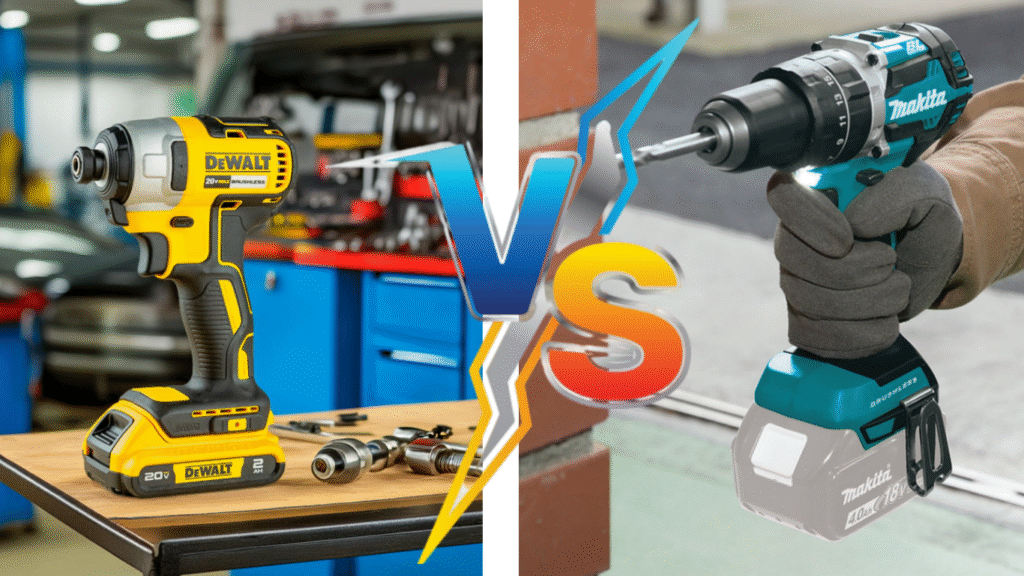
When it comes to choosing the right cordless impact driver for professional and DIY projects, the DeWalt DCD800 and Makita XPH12 stand out as top contenders, each offering impressive features tailored to different needs. In this comprehensive comparison, we’ll evaluate their performance, durability, ergonomics, battery life, and affordability based on real-world on-site testing. Whether you’re a seasoned tradesperson or a weekend warrior, understanding the strengths and weaknesses of each tool will help you make an informed purchase.
Performance and Power
The DeWalt DCD800 boasts a brushless motor that delivers up to 2,000 RPM and 1,700 in-lb of torque, making it ideal for heavy-duty tasks like driving large fasteners or working with dense materials. Its high-speed mode ensures rapid screw driving, while the enhanced torque provides ample power for tough applications. The Makita XPH12 also features a brushless motor but offers slightly lower torque at about 1,250 in-lb, with speeds reaching 2,000 RPM. While it may seem less powerful on paper, the XPH12’s precision and control shine during delicate tasks and fastener driving in tight spaces. On-site tests reveal that the DCD800 excels in high-torque applications, effortlessly driving large lag bolts and thick deck screws. Conversely, the Makita XPH12’s lightweight design and refined control make it perfect for lighter tasks, such as cabinet assembly or electrical work.
Design and Ergonomics
Comfort during extended use is vital on-site. The DeWalt DCD800 features a robust, slightly bulkier body with a rubberized grip that offers solid handling, though some users may find it a bit heavier over prolonged periods. Its balanced weight distribution helps reduce fatigue during demanding jobs. The Makita XPH12 is notably lighter and more compact, weighing approximately 3.4 pounds, which enhances maneuverability in tight spots and overhead work. Its ergonomic design includes a soft grip that minimizes vibrations and provides comfort for prolonged use. During on-site testing, users appreciated the Makita’s lighter weight for overhead tasks, while the DeWalt’s sturdy build felt more reassuring for heavy-duty applications.
Battery Life and Charging
Both tools are compatible with their respective battery ecosystems—DeWalt’s 20V MAX and Makita’s 18V LXT. In real-world usage, the DCD800’s 5.0Ah battery provided around 3 hours of continuous work, thanks to its efficient motor and high-capacity pack. The Makita XPH12’s 4.0Ah battery delivered comparable runtime, with quick charging times of approximately 30 minutes. For job sites with multiple tools, battery interchangeability is a key consideration: DeWalt’s extensive 20V MAX line offers versatility, while Makita’s LXT system provides excellent compatibility across a broad range of tools. During testing, both batteries maintained consistent power output, though the DeWalt’s larger capacity gave it a slight edge for extended sessions.
Durability and Build Quality
On-site environments demand robust tools that can withstand drops, dust, and moisture. The DeWalt DCD800’s rugged construction, reinforced housing, and sealed components ensure longevity. Its metal chuck and durable gearbox further enhance durability. The Makita XPH12 also features a sturdy magnesium gear housing and high-quality materials, making it resistant to impacts. Users reported that both tools held up well under rough conditions, with the DeWalt feeling slightly more rugged, especially after dropping from heights during demanding tasks.
Additional Features
The DeWalt DCD800 includes a 3-speed transmission, allowing users to tailor speed and torque to specific tasks. Its LED work light with a 20-second delay improves visibility in low-light conditions. The Makita XPH12 offers a 2-speed gearbox with variable speed control, and an LED light with a pre-glow feature that assists in precision work. Both tools feature belt hooks for easy carrying on-site, though DeWalt’s hook is more robust and adjustable.
Price and Value
Pricing varies based on package deals and retailer, but generally, the DeWalt DCD800 tends to be slightly more expensive due to its higher power and additional features. However, its durability and performance justify the investment for heavy-duty users. The Makita XPH12 offers excellent value for those needing a lightweight, versatile impact driver for lighter applications. Considering long-term costs, both tools come with 3-year warranties and access to extensive service networks.
Which One Should You Buy?
If your work involves heavy-duty fastening, large fasteners, and demanding applications, the DeWalt DCD800 is the superior choice thanks to its higher torque, robust build, and versatile features. On the other hand, if you prioritize lightweight design, precision, and working in tight spaces or overhead, the Makita XPH12 offers excellent control and comfort, making it a reliable partner for lighter tasks.
Final Thoughts
Choosing between the DeWalt DCD800 and Makita XPH12 ultimately depends on your specific needs and work environment. Both impact drivers are capable, durable, and backed by reputable brands, ensuring you get value for your investment. For on-site professionals dealing with heavy-duty tasks, DeWalt’s power and ruggedness make it the best fit. For those who value ease of use, portability, and versatility in lighter jobs, Makita’s impact driver is an excellent choice. Remember to consider your typical workload, battery ecosystem preferences, and ergonomic comfort when making your decision. With either tool in your arsenal, you’ll be well-equipped to tackle your projects efficiently and effectively.
Note: Always check current prices, warranty details, and latest model updates before purchasing. This guide aims to provide an honest, on-site perspective based on recent evaluations and user feedback.
